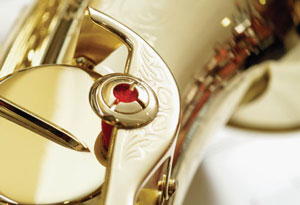
Photo: Thinkstock
The Power of Music Rising
When Hurricane Katrina surged through New Orleans, it destroyed whole neighborhoods, thousands of lives—and perhaps less obviously, countless musical instruments. The rising floodwaters struck at the city's heart, but music was always its soul, and two people who understood that were U2's lead guitarist, the Edge, and legendary music producer Bob Ezrin. In 2005, along with partner Gibson Guitar, they created Music Rising, a charity with a single goal: to get the bons temps rolling again by replacing all the lost instruments in the region that shaped jazz, funk, gospel, and rock 'n' roll. Last spring they expanded to Nashville, when the country music capital was deluged as well. "Similar to New Orleans, we realized there was a real jeopardy here, that a lot of musicians would lose their livelihood," Edge says.
To identify need and raise funds, Music Rising partners with MusiCares, Guitar Center Music Foundation, and the New Orleans Jazz & Heritage Festival, among others. This fall the group is working with Tulane University to create a course about the musical roots of the Gulf Coast, a region that Edge refers to as a "crucible." In such a place, a trombone or a guitar or a drum set is more than an instrument; it's the key to a heritage. Right after Katrina, Ezrin recalls, "wherever the music was silent, it felt depressing. But where people had gathered to play, there was a feeling of solidarity, of community, and of hope." — Susan Casey
When Hurricane Katrina surged through New Orleans, it destroyed whole neighborhoods, thousands of lives—and perhaps less obviously, countless musical instruments. The rising floodwaters struck at the city's heart, but music was always its soul, and two people who understood that were U2's lead guitarist, the Edge, and legendary music producer Bob Ezrin. In 2005, along with partner Gibson Guitar, they created Music Rising, a charity with a single goal: to get the bons temps rolling again by replacing all the lost instruments in the region that shaped jazz, funk, gospel, and rock 'n' roll. Last spring they expanded to Nashville, when the country music capital was deluged as well. "Similar to New Orleans, we realized there was a real jeopardy here, that a lot of musicians would lose their livelihood," Edge says.
To identify need and raise funds, Music Rising partners with MusiCares, Guitar Center Music Foundation, and the New Orleans Jazz & Heritage Festival, among others. This fall the group is working with Tulane University to create a course about the musical roots of the Gulf Coast, a region that Edge refers to as a "crucible." In such a place, a trombone or a guitar or a drum set is more than an instrument; it's the key to a heritage. Right after Katrina, Ezrin recalls, "wherever the music was silent, it felt depressing. But where people had gathered to play, there was a feeling of solidarity, of community, and of hope." — Susan Casey
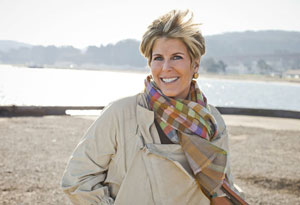
Photo: Marc Royce
The Power of the Savings Craze
It's a stretch to say we should be grateful for the Great Recession, but for many Americans, economic hardship has proved to be a remarkable catalyst for change—and I mean change for the better. Paying down debt is one of the most effective ways to save, and ever since the financial crisis swept in, we've been in the midst of a massive savings binge. Our national tab for credit card debt has fallen from an all-time high of $989 billion in December 2008 to $831 billion today. Clearly, there's still room for improvement—but a 16 percent reduction in such a short period is unprecedented progress. As is the fact that about two-thirds of credit card users say they now pay their bill in full each month, compared with 43 percent a year ago. We're witnessing a nationwide revelation: Unloading debt means you have more money to put toward your emergency fund, your retirement account—your future. Maximize your savings and you maximize your financial freedom. And there's every indication that this trend will persist. About half of Americans say they intend to save even more once the economy recovers, according to Pew Research. Saving, it seems, is the new status symbol. — Suze Orman
It's a stretch to say we should be grateful for the Great Recession, but for many Americans, economic hardship has proved to be a remarkable catalyst for change—and I mean change for the better. Paying down debt is one of the most effective ways to save, and ever since the financial crisis swept in, we've been in the midst of a massive savings binge. Our national tab for credit card debt has fallen from an all-time high of $989 billion in December 2008 to $831 billion today. Clearly, there's still room for improvement—but a 16 percent reduction in such a short period is unprecedented progress. As is the fact that about two-thirds of credit card users say they now pay their bill in full each month, compared with 43 percent a year ago. We're witnessing a nationwide revelation: Unloading debt means you have more money to put toward your emergency fund, your retirement account—your future. Maximize your savings and you maximize your financial freedom. And there's every indication that this trend will persist. About half of Americans say they intend to save even more once the economy recovers, according to Pew Research. Saving, it seems, is the new status symbol. — Suze Orman
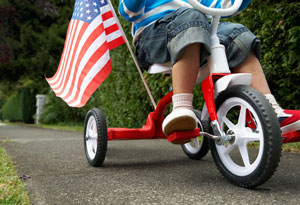
Photo: Thinkstock
The Power of Not In Our Town
In February a Muslim boy in Texas had his jaw broken by a fellow student who called him "terrorist." In March guests of a hotel in Florida requested they not be served by anyone of color. And in April two Oregon college students scrawled homophobic graffiti on a dorm wall.
The Department of Justice estimates that close to 191,000 hate-based incidents occur in the United States each year. But some people are unwilling to tolerate intolerance—and this spring their cause got a major boost when an organization called Not in Our Town launched Niot.org, a website that provides ordinary citizens with tools to combat hate in their area. In just a few months, the site has helped nearly 40 Not in Our Town groups form across the country. "People understand that we can't just look away," says project cofounder Patrice O'Neill.
This year marks the 15th anniversary of the first Not in Our Town documentary, which gave rise to the namesake organization and a series of PBS specials. The series spotlights communities like Billings, Montana, where residents of all faiths united in response to the breaking of a window displaying a menorah by hanging pictures of menorahs in their own windows; and Bloomington, Illinois, where people marched in protest of African-American churches destroyed by arson in the South.
Niot.org has become a clearinghouse for similar stories. The war against hate isn't over, but Not in Our Town is arming citizens to win it one battle at a time. — Katie Arnold-Ratliff
In February a Muslim boy in Texas had his jaw broken by a fellow student who called him "terrorist." In March guests of a hotel in Florida requested they not be served by anyone of color. And in April two Oregon college students scrawled homophobic graffiti on a dorm wall.
The Department of Justice estimates that close to 191,000 hate-based incidents occur in the United States each year. But some people are unwilling to tolerate intolerance—and this spring their cause got a major boost when an organization called Not in Our Town launched Niot.org, a website that provides ordinary citizens with tools to combat hate in their area. In just a few months, the site has helped nearly 40 Not in Our Town groups form across the country. "People understand that we can't just look away," says project cofounder Patrice O'Neill.
This year marks the 15th anniversary of the first Not in Our Town documentary, which gave rise to the namesake organization and a series of PBS specials. The series spotlights communities like Billings, Montana, where residents of all faiths united in response to the breaking of a window displaying a menorah by hanging pictures of menorahs in their own windows; and Bloomington, Illinois, where people marched in protest of African-American churches destroyed by arson in the South.
Niot.org has become a clearinghouse for similar stories. The war against hate isn't over, but Not in Our Town is arming citizens to win it one battle at a time. — Katie Arnold-Ratliff
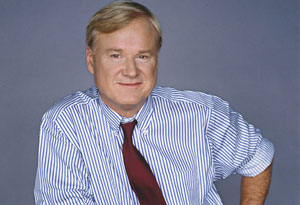
Photo: Courtesy of Chris Matthews
The Power of Apology
We Americans like true leaders. One sign of greatness in a leader is the readiness to take the blame when an event breaks bad. Think of President Obama's words after the "Christmas bomber" was caught aboard Flight 253, landing in Detroit. "When the system fails," he said of the U.S. intelligence community's inability to connect the clues, "it is my responsibility. Ultimately the buck stops with me."
That's what Americans respect. After the failed 1961 invasion of Cuba at the Bay of Pigs by a U.S.-backed exile force, President John F. Kennedy took "sole responsibility" for the catastrophe. His Gallup poll favorability rating, already high, rose to 83 percent, the highest of his presidency.
But a leader's willingness to take responsibility, especially when it hurts, is not an American monopoly. This June the British government finally took full blame for "Bloody Sunday," the tragic incident in 1972 when its soldiers opened fire and killed 13 people in Northern Ireland. The message from Prime Minister David Cameron was clear:
"I am deeply patriotic. I never want to believe anything bad about our country.... But the conclusions of this report are absolutely clear. There is no doubt. There is nothing equivocal. There are no ambiguities. What happened on Bloody Sunday was both unjustified and unjustifiable. It was wrong."
Cameron's words are a superb example of a leader insisting on strict accountability. All the way up the line. — Chris Matthews
We Americans like true leaders. One sign of greatness in a leader is the readiness to take the blame when an event breaks bad. Think of President Obama's words after the "Christmas bomber" was caught aboard Flight 253, landing in Detroit. "When the system fails," he said of the U.S. intelligence community's inability to connect the clues, "it is my responsibility. Ultimately the buck stops with me."
That's what Americans respect. After the failed 1961 invasion of Cuba at the Bay of Pigs by a U.S.-backed exile force, President John F. Kennedy took "sole responsibility" for the catastrophe. His Gallup poll favorability rating, already high, rose to 83 percent, the highest of his presidency.
But a leader's willingness to take responsibility, especially when it hurts, is not an American monopoly. This June the British government finally took full blame for "Bloody Sunday," the tragic incident in 1972 when its soldiers opened fire and killed 13 people in Northern Ireland. The message from Prime Minister David Cameron was clear:
"I am deeply patriotic. I never want to believe anything bad about our country.... But the conclusions of this report are absolutely clear. There is no doubt. There is nothing equivocal. There are no ambiguities. What happened on Bloody Sunday was both unjustified and unjustifiable. It was wrong."
Cameron's words are a superb example of a leader insisting on strict accountability. All the way up the line. — Chris Matthews
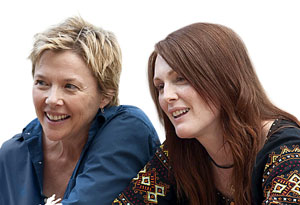
Photo: Focus Features
The Power of Love
The power of love is so great that all it takes is an image. A snippet. A snapshot. A girl's face in a passing train, a desperate embrace in the street. Bear witness to love, even from afar, and it changes you, sets a bird free in your chest.
Filmmakers know this. And thank God for that. Because watching something as gorgeous and powerful as Annette Bening and Julianne Moore wrestle in their ocean of love onscreen in The Kids Are All Right (right) does more than make a political statement; it blasts politics to atoms. In the film, as in life, when it comes to love, the particulars are irrelevant. Recently U.S. district judge Joseph Tauro wrote, "To further divide the class of married individuals into those with spouses of the same sex and those with spouses of the opposite sex is to create a distinction without meaning."
He's right, of course. The power of love is not dependent upon anything as prosaic as gender or age. What matters is the "connection of one soul to another, the elemental magic that convinces you that you matter. That you are seen. That you are not alone. — Allison Glock-Cooper
The power of love is so great that all it takes is an image. A snippet. A snapshot. A girl's face in a passing train, a desperate embrace in the street. Bear witness to love, even from afar, and it changes you, sets a bird free in your chest.
Filmmakers know this. And thank God for that. Because watching something as gorgeous and powerful as Annette Bening and Julianne Moore wrestle in their ocean of love onscreen in The Kids Are All Right (right) does more than make a political statement; it blasts politics to atoms. In the film, as in life, when it comes to love, the particulars are irrelevant. Recently U.S. district judge Joseph Tauro wrote, "To further divide the class of married individuals into those with spouses of the same sex and those with spouses of the opposite sex is to create a distinction without meaning."
He's right, of course. The power of love is not dependent upon anything as prosaic as gender or age. What matters is the "connection of one soul to another, the elemental magic that convinces you that you matter. That you are seen. That you are not alone. — Allison Glock-Cooper
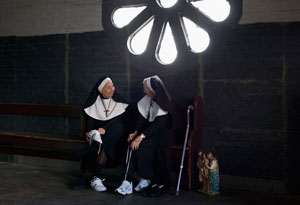
Photo: Thinkstock
The Power of Speaking Up
Catholic sisters are naive, out-of-touch relics, right?
Anyone who harbored that stereotype was in for a surprise last spring. When Congress was voting on healthcare reform, a group of Catholic women's religious orders, representing 59,000 sisters overall, announced their support of the bill. By doing so they were defying the U.S. Catholic bishops, who opposed the bill because of what was seen as its favorable stance on abortion.
Most people would have expected sisters to be silent. Smart Catholics knew better. After all, many of these women had worked in or run hospitals that cared for the poor, and had seen firsthand the urgent need for more healthcare—even in a bill that they agreed wasn't perfect. So when the sisters spoke, in the form of a well-reasoned statement, their voice was unimpeachable. Said Sister Simone Campbell, a spokesperson for the group, "When people are suffering, we respond."
Sisters have long been depicted in pop culture as clueless followers. I've always lamented this, since the ones I know—who toil in refugee camps, counsel the desperate in drop-in centers, and teach in countless Catholic schools—are the unsung heroes of the church. And, by the way, their vow of poverty means that they do all this for free.
They are my heroes. This year they were heroes to millions more as well. — James Martin, Catholic priest and author of The Jesuit Guide to (Almost) Everything (HarperOne)
Catholic sisters are naive, out-of-touch relics, right?
Anyone who harbored that stereotype was in for a surprise last spring. When Congress was voting on healthcare reform, a group of Catholic women's religious orders, representing 59,000 sisters overall, announced their support of the bill. By doing so they were defying the U.S. Catholic bishops, who opposed the bill because of what was seen as its favorable stance on abortion.
Most people would have expected sisters to be silent. Smart Catholics knew better. After all, many of these women had worked in or run hospitals that cared for the poor, and had seen firsthand the urgent need for more healthcare—even in a bill that they agreed wasn't perfect. So when the sisters spoke, in the form of a well-reasoned statement, their voice was unimpeachable. Said Sister Simone Campbell, a spokesperson for the group, "When people are suffering, we respond."
Sisters have long been depicted in pop culture as clueless followers. I've always lamented this, since the ones I know—who toil in refugee camps, counsel the desperate in drop-in centers, and teach in countless Catholic schools—are the unsung heroes of the church. And, by the way, their vow of poverty means that they do all this for free.
They are my heroes. This year they were heroes to millions more as well. — James Martin, Catholic priest and author of The Jesuit Guide to (Almost) Everything (HarperOne)
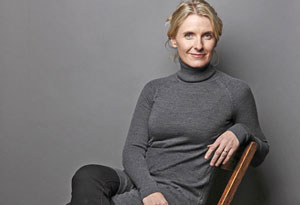
Photo: Ben Baker
The Power of Organic Banking
Do you know where your money is? Yeah. Me neither. Until recently, that is. I live in a small town, which is fighting bravely to hold itself together during a big recession. In the past few years, a couple of locals have surfaced with bright ideas to help revive our economy—for instance, by opening a bakery, like my friend Patricia. Or a coffee shop, a Pilates studio, or a pair of funky gift shops, like my friends Maria, Sarah, Kate, and Meg.
These entrepreneurial women were talented and passionate. The only thing they didn't have was capital—and that was a big problem, because it's become almost impossible to pry loans out of America's mighty, TARP-hoarding banking interests. But I had some money. So my decision was simple: Take my money out of the bank and fold it, instead, into my community.
I offered each woman a loan at half the going rate, along with a year off before they had to start paying me back—and I'm still earning more interest than if I'd left that cash in a savings account.
There are three things I want to make clear: (1) This is not charity (we set up legally binding contracts, with online services like Virgin Money and LoanBack), (2) obviously you don't want to deplete crucial family funds to make private loans—only do this if you can afford the risks, because... (3) of course there are risks. Still, here's my manifesto: If you're lucky enough to have extra cash sitting around these days, get out there and become a bank yourself. You cannot imagine what riches await you. — Elizabeth Gilbert
More on Power
Do you know where your money is? Yeah. Me neither. Until recently, that is. I live in a small town, which is fighting bravely to hold itself together during a big recession. In the past few years, a couple of locals have surfaced with bright ideas to help revive our economy—for instance, by opening a bakery, like my friend Patricia. Or a coffee shop, a Pilates studio, or a pair of funky gift shops, like my friends Maria, Sarah, Kate, and Meg.
These entrepreneurial women were talented and passionate. The only thing they didn't have was capital—and that was a big problem, because it's become almost impossible to pry loans out of America's mighty, TARP-hoarding banking interests. But I had some money. So my decision was simple: Take my money out of the bank and fold it, instead, into my community.
I offered each woman a loan at half the going rate, along with a year off before they had to start paying me back—and I'm still earning more interest than if I'd left that cash in a savings account.
There are three things I want to make clear: (1) This is not charity (we set up legally binding contracts, with online services like Virgin Money and LoanBack), (2) obviously you don't want to deplete crucial family funds to make private loans—only do this if you can afford the risks, because... (3) of course there are risks. Still, here's my manifesto: If you're lucky enough to have extra cash sitting around these days, get out there and become a bank yourself. You cannot imagine what riches await you. — Elizabeth Gilbert
More on Power




